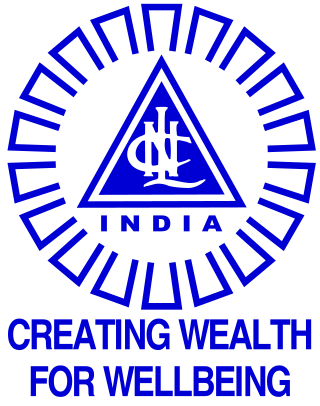
Steel Authority of India Limited (SAIL) is a central public sector undertaking (PSU) based in New Delhi, India. It is under the ownership of the Ministry of Steel, Government of India with an annual turnover of ₹105,398 crore (US$13 billion) for the fiscal year 2022-23. Incorporated on 24 January 1973, SAIL has 57,139 employees. With an annual production of 18.29 million metric tons, It is the largest government owned steel producer. The hot metal production capacity of the company will further increase and is expected to reach a level of 50 million tonnes per annum by 2025.

NLC India Limited (NLC) is a central public sector undertaking under the administrative control of the Ministry of Coal, Government of India. It annually produces about 30 million tonnes of lignite from opencast mines at Neyveli in the state of Tamil Nadu in southern India and at Barsingsar in Bikaner district of Rajasthan state. The lignite is used at pithead thermal power stations of 3640 MW installed capacity to produce electricity. Its joint venture has a 1000 MW thermal power station using coal. Lately, it has diversified into renewable energy production and installed 1404 MW solar power plant to produce electricity from photovoltaic (PV) cells and 51 MW electricity from windmills.

Newcrest Mining Limited is an Australian-based corporation which engages in the exploration, development, mining and sale of gold and the froth flotation product, gold-copper concentrate. It is Australia's leading gold mining company and its operations have expanded beyond Australia, for example Indonesia, thus becoming a prominent international mining corporation. Newmont initially started the company as a subsidiary in 1966. The subsidiary became Newmont Holdings Pvt Ltd in 1980 and in 1990 acquired 100 per cent of Australmin Holdings Limited taking the current name.

The Cape Breton Development Corporation, or DEVCO, was a Government of Canada Crown corporation. It ceased operation on December 31, 2009, after being amalgamated with Enterprise Cape Breton Corporation (ECBC).

Mitsui & Co., Ltd. is one of the largest sogo shosha in Japan; it is part of the Mitsui Group.

Tavan Tolgoi is one of the world's largest untapped coking and thermal coal deposits, located in the Ömnögovi Province in southern Mongolia. It has a total estimated resource of 6.4 billion tonnes, one quarter of which is high quality coking coal. It is divided into six sections: Tsankhi, Ukhaa Khudag, Bor tolgoi, Borteeg, and Southwest and Eastern coalfields. The Tsankhi section is the largest part, and is divided into East and West Tsankhi - these have had the most focus recently.
Eldev Coal Mine is in Dalanjargalan sum (district) of Dornogovi Province in South-Eastern Mongolia. This mine is 21 km N from sum center and 300 km SE of Mongolian capital Ulan Bator.
The Nariin Sukhait or Ovoot Tolgoi mining complex is located in the Gurvan tes sum (district) of Ömnögovi Province in Southern Mongolia. The site is 25 km SE from sum center and 56 km north of Shivee Khüren - Ceke crossing point on the Mongolian-Chinese border.

The Mining industry of Ghana accounts for 5% of the country's GDP and minerals make up 37% of total exports. Gold contributes over 90% of the total mineral exports. Thus, the main focus of Ghana's mining and minerals development industry remains focused on gold. Ghana is Africa's largest gold producer, producing 80.5 t in 2008. Ghana is also a major producer of bauxite, manganese and diamonds. Ghana has 20 large-scale mining companies producing gold, diamonds, bauxite and manganese; over 300 registered small scale mining groups; and 90 mine support service companies. Other mineral commodities produced in the country are natural gas, petroleum, salt, and silver.

The mining industry of Botswana has dominated the national economy of Botswana since the 1970s, being a primary sector industry. Diamond has been the leading component of the mineral sector ever since production of gems started being extracted by the mining company Debswana. Most of Botswana's diamond production is of gem quality, resulting in the country's position as the world's leading producer of diamond by value. Copper, gold, nickel, coal and soda ash production also has held significant, though smaller, roles in the economy.
In 2006, Cambodia's mineral resources remained, to a large extent, unexplored. Between 2003 and 2006, however, foreign investors from Australia, China, South Korea, Thailand, and the United States began to express their interest in Cambodia's potential for offshore oil and gas as well as such land-based metallic minerals as bauxite, copper, gold, and iron ore, and such industrial minerals as gemstones and limestone.

Mining is the biggest contributor to Namibia's economy in terms of revenue. It accounts for 25% of the country's income. Its contribution to the gross domestic product is also very important and makes it one of the largest economic sectors of the country. Namibia produces diamonds, uranium, copper, magnesium, zinc, silver, gold, lead, semi-precious stones and industrial minerals. The majority of revenue comes from diamond mining. In 2014, Namibia was the fourth-largest exporter of non-fuel minerals in Africa.
Mining of industrial minerals was insignificant to Bhutan’s economy except for the production of ferrosilicon. The country’s rugged terrain provides sites to harvest hydropower, which has driven rapid growth in the transport and construction sectors, including the startup of a number of local cement operations.

Tajikistan has rich deposits of gold, silver, and antimony. The largest silver deposits are in Sughd Province, where Tajikistan's largest gold mining operation is also located. Russia's Norilsk nickel company has explored a large new silver deposit at Bolshoy Kanimansur. More than 400 mineral deposits of some 70 different minerals have been discovered in Tajikistan, including strontium, tungsten, molybdenum, bismuth, salt, lead, zinc, fluorspar, and mercury. These minerals have been found suitable for mining. Uranium, an important mineral in the Soviet era, remains in some quantity but is no longer being extracted. The Tajikistan Aluminium Company (TALCO), an aluminium smelter, is the country's only large-scale production enterprise in the mining sector. Tajikistan hosts the annual Mining World Tajikistan, an international exhibition on mining in Dushanbe.

The mineral mining industry is a crucial piece of the Economy of Niger. Exports of minerals consistently account for 40% of exports.

NTPC Limited, formerly known as National Thermal Power Corporation, is an Indian central Public Sector Undertaking (PSU) under the ownership of the Ministry of Power and the Government of India, who is engaged in the generation of electricity and other activities. The headquarters of the PSU are situated at New Delhi. NTPC's core function is the generation and distribution of electricity to State Electricity Boards in India. The body also undertakes consultancy and turnkey project contracts that involve engineering, project management, construction management, and operation and management of power plants.

The Harita Group is an Indonesian business conglomerate owned and controlled by the Lim family. The group's core businesses are in the natural resources sector, which operates throughout Indonesia. Today, the Harita Group has businesses in nickel mining, ferronickel smelters, bauxite mining, alumina refineries, palm oil plantations, shipping, timber, coal and property. After the 2014 government regulations to ban exports of raw minerals, Harita Group and its partners built a $400 million ferronickel smelter and Indonesia's first alumina refinery for $900 million, both of which have been completed and in full operation since 2016. In December 2019, Glencore International became a partner of Harita Group via its share sale and rights issue of Indonesian-listed Cita Mineral. In June 2021, Harita commissioned the first HPAL plant in Indonesia, which produces Mixed Hydroxide Precipitate, a raw material for electric vehicle batteries. The project had an estimated cost of $1 billion. The current CEO of Harita Group is Lim Gunawan Hariyanto.

Mining is important to the national economy of Mongolia. Mongolia is one of the 29 resource-rich developing countries identified by the International Monetary Fund and exploration of copper and coal deposits are generating substantial additional revenue.
Mining in North Korea is important to the country's economy. North Korea is naturally abundant in metals such as magnesite, zinc, tungsten, and iron; with magnesite resources of 6 billion tonnes, particularly in the North and South Hamgyong Province and Chagang Province. However, often these cannot be mined due to the acute shortage of electricity in the country, as well as the lack of proper tools to mine these materials and an antiquated industrial base. Coal, iron ore, limestone, and magnesite deposits are larger than other mineral commodities. Mining joint ventures with other countries include China, Canada, Egypt, and South Korea.

Murray & Roberts Holdings Ltd. is a South African-based engineering and mining contractor. It is listed on the JSE Securities Exchange. The Group delivers its capabilities into three global primary market sectors the resources, industrial, energy, water and specialised infrastructure market sectors.















